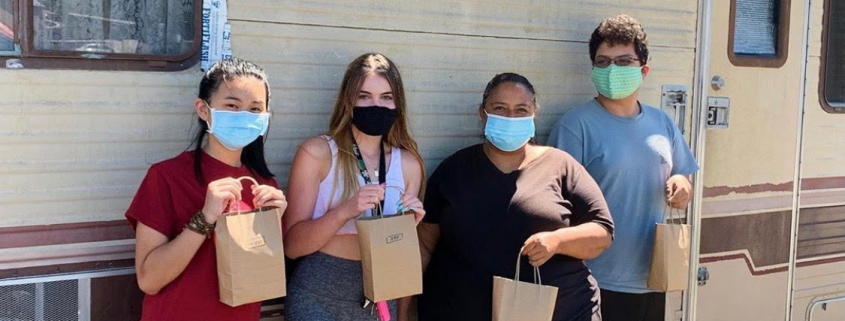Student nonprofit provides food and supplies to unhoused populations in Bay Area

(Photo courtesy of Hope Hearted)
While volunteering at local food banks during the ongoing coronavirus pandemic, a group of students realized that nationwide shortages on food and supplies have led to a decrease in donations, placing unhoused populations, who are already vulnerable, at a higher risk of contracting the coronavirus.
To help alleviate these disparities, several students teamed up to rally volunteers, set up an assembly line with socially distanced tables and compiled sanitary kits one by one. In the process, Hope Hearted, a nonprofit organization dedicated to providing food and sanitary supplies to unhoused populations in the Bay Area, was born.
To help protect these vulnerable populations, Hope Hearted began distributing sanitary supply kits, including masks and hand sanitizer, at shelters and food banks across the Bay Area beginning in mid March.
“We want to essentially bridge the access gap in COVID sanitary supplies, and make sure that the unhoused community have access to the same sanitary supplies that the average person did,” said Chloe Duckworth, a sophomore majoring in computational neuroscience and COO of Hope Hearted. “They don’t have access to the same health care that the average person does, so they’re also more likely to be put in the ICU and to die from COVID than the average person.”
After seeing this need, Chloe and her sister Heather, along with Asavari Gowda and Quynh Nguyen, formed Hope Hearted.
One of Hope Hearted’s partners is Second Harvest, a food bank in California whose mission is to end hunger in Santa Cruz County by providing fresh produce for those in need while also working to erase the stigma associated with food banks. Since March, Second Harvest has served almost 3,000 families a week, nearly three times as many as it averaged before the pandemic began, according to Josue Barajas, the organization’s nutrition programs director.
Jazmin Ponce, Second Harvest’s community engagement coordinator, helped establish the partnership between the two organizations. Ponce said she believes partnering with Hope Hearted was a great way to combine both organizations’ vision for the community, allowing residents to access both food and sanitary supplies.
“It is a difficult time right now, and when [Hope Hearted] went to one of our sites in September, the participants were really surprised and really happy that they were able to get a goodie bag at the end of the day when they got their food,” Ponce said.
To raise money for these supplies, Hope Hearted set up a donation box through its website to expand its donor network beyond friends and family. The organization also partners with local groups, including Girl Scout troops, that help them fundraise.
“The community has really come together and tried to help the unhoused through our organization. We’ve received so much support, even from people that couldn’t donate but they would share it on their Facebook,” Chloe said. “[Even if] small businesses couldn’t donate, they would post [our] flyer and talk about us to the customers. Things like that really inspired me and encouraged me to keep going because I know that I had the support of the community, which was really meaningful.”
Currently, Hope Hearted relies primarily on community donations to fund its projects, but the organization hopes to achieve more corporate sponsorships from businesses that are financially able to provide larger donations, according to Chloe, who focuses primarily on financial tracking and transactions.
“I’d like to scale up so we’re not constantly asking the community for money when everyone is struggling financially right now,” she said. “That doesn’t really feel right, so I’m trying to get more corporate sponsorships and apply for grants from larger foundations that are able to provide $1,000 here and there to basically sustain our operation.”
As of now, Hope Hearted’s partners include Costco, Target and Lucky’s, all of which donated store credit for the organization to buy supplies. The organization also received funding from local council members in Fremont and other community funds for the work they’ve done.
Sarah Daoudi, a USC sophomore majoring in neuroscience, is a volunteer at Hope Hearted who helps with the distribution of sanitation kits. Through her work at the organization, Daoudi said she has witnessed the benefits of the organization’s pledge to make sure supplies are being put to proper use. Before Hope Hearted was an established organization, the students received donations from hospitals, such as O’Connor Hospital, which kickstarted the project that became the foundation for the organization. Oftentimes, supplies are thrown out by hospitals if the material does not meet their strict standards, Daoudi said.
By partnering with local hospitals, Hope Hearted ensures that they are making full use of all resources so that supplies are not being wasted while others are struggling to get access to them.
“[Hope Hearted] started out as an initiative to not waste,” Daoudi said. “They began reallocating resources to make sure everyone’s getting the best use out of everything.”
Because of the coronavirus pandemic, members of the unhoused population are in need of products they need to survive. For Hope Hearted, its mission is to help make these supplies more accessible, Chloe said.
“The overall response that we’ve received has been overwhelmingly positive,” Chloe said. “People are very grateful to be getting the supplies that we’re just giving them.”

